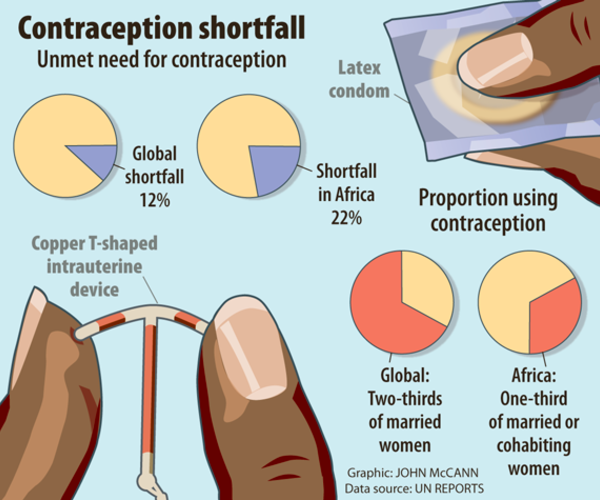A Nigerian and a Kenyan use social media and the football pitch to discuss contraceptives and stop pregnancy.
COMMENT
As you read this, young people all over the world are having sex. Yet, despite that undeniable fact, it remains extremely difficult to get the information and services we need to have safe and healthy sexual experiences. We’re turned away from health facilities, told to stop asking inappropriate questions and made to feel ashamed.
In our own countries, Nigeria and Kenya, we’ve seen firsthand the detrimental effects misinformation about contraceptives and inaccessibility to healthcare have on our friends’ lives. But rather than discourage us, these experiences strengthen our resolve to create change.
Jennifer Amadi (28), Nigeria: Social media for safer sex
During my first year at university in Nigeria, my 18-year-old roommate Kathy (name changed) started dating a guy from school. Kathy was a close friend, so as her relationship became more serious, I asked her if she was using contraceptives. She wasn’t, and told me she didn’t even know how to get contraceptives. Before long, Kathy became pregnant. Worried what her father, a religious leader, would do if he found out, Kathy secretly ended her pregnancy on her own. In the process, Kathy lost her life.
Kathy’s death was a turning point for me. I realised that engaging young people in the conversation around family planning is not optional; it is a matter of survival. Although contraceptive use is growing for young people in Nigeria – with almost 60% of unmarried young women now using contraceptives – there is still a long way to go towards providing access to everyone.
- READ: How female condoms can empower women here
I started working at DKT Nigeria, a social marketing organisation that provides contraceptives at affordable prices. My job was to share information on where to get and how to use contraceptive products in a way that resonated with young people. In just seven months, I gained more than 3 000 young readers who followed me online, and organised hangouts where young people could talk to each other, ask questions and receive free condoms at the end.
My readers came to associate my name with contraceptives and my inbox filled up with their questions: “Is there a clinic in Lagos that will prescribe contraceptives to teenagers?” or “My boyfriend and I started having sex. How can I prevent a pregnancy?” By answering each one truthfully, I hoped to ensure that no one succumbed to the same fate as Kathy.

Evans Odenyo (23), Kenya: Talking sex with sport
For most young people in Kenya, football and family planning don’t necessarily go hand in hand. But for me, a football coach, they are a natural pair. Growing up, I saw too many girls drop out of school because of early pregnancy. Almost everyone I knew was having sex – they were also playing football.
One day, after winning a big tournament, I watched my players celebrate their achievement. As they hugged and rejoiced, I envisioned them celebrating even bigger achievements in their lives – scoring an A in an exam, graduating from college or starting a new job. If they fell pregnant, they would have to give up those goals.
I asked my players: “How many of you have a friend who became pregnant by accident?” Almost all of them raised their hands. I then asked if they knew how to prevent pregnancy or where to get condoms. When my players averted their eyes and giggled uncomfortably, I knew the answer was no.
I started integrating conversations about sex and family planning into practice. In one drill, I have the ball represent an unwanted pregnancy and players must name a contraceptive method as they pass it away. Condoms are available on the pitch and I always leave time at the end of practice for questions. Players know they can ask me about anything.
As a guy in my 20s, I might not be the typical family planning advocate, but contraceptive use is not a woman’s issue alone. I encourage the boys to participate too, and promote a comfortable co-ed discussion. Because of the conversations we’re having with both girls and boys, contraceptive use has increased among my players. They are making better choices on the field and off.
Global movement
Word is catching on that there is power in family planning programmes built by youth for youth.
In May, hundreds of young people will attend Women Deliver, the world’s largest conference on the health and rights of women and girls. Attendees will have the opportunity to speak to global leaders about youth and contraceptives. The current generation of young people is the largest in history. For our generation to reach its full potential, it is essential we have access to sexual and reproductive health information and services. Who better to address the concerns of young people than young people themselves?
Read about birth control is a luxury for many African women here.
Jennifer Amadi worked as a contraception advocate for social marketing organisation DKT Nigeria at the time of writing the article but now works for the Strong Enough Girls Initiative. Evans Odenyo advocates for access to contraception in Kenya.
